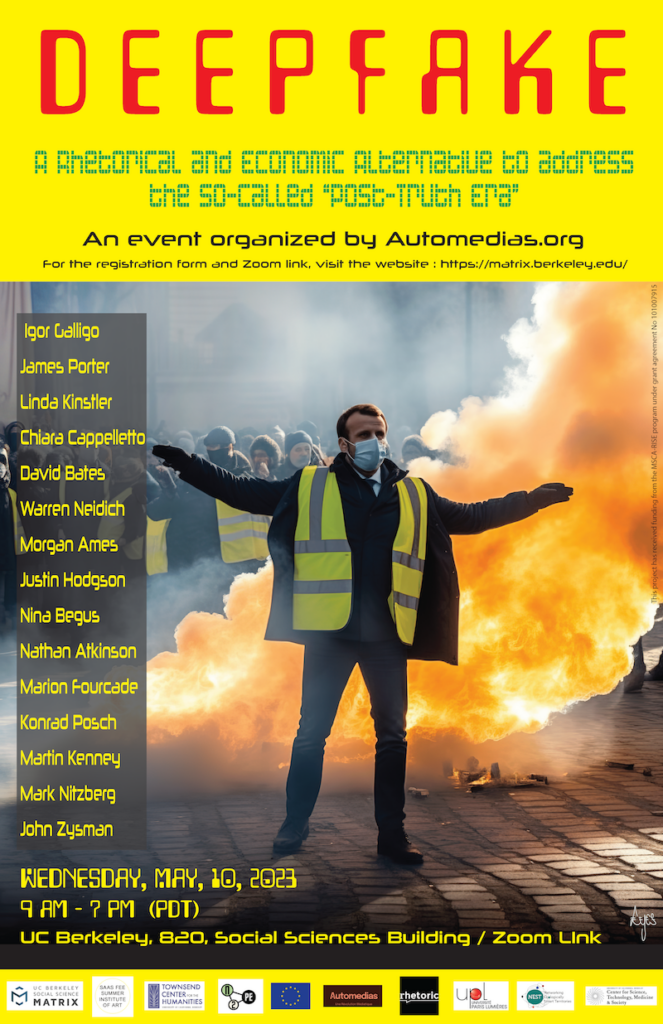Since Greek antiquity, there have been two fundamentally different conceptualizations of the search for truth. On the one hand, platonic politics proposed to control the city by subjecting political expression to the philosophical concept. On the other hand, the rhetorical tradition opposed the logocratic and universal claim of philosophy, in the name of the diversity of subjectivities and forms of life that composed the demos, and justified democratic deliberation as a form and process of agreement and democratic agency.
This symposium aims to develop a critique of the current debates about Post-Truth and fakeness, and specifically of Big Tech’s effort to frame the political expression of the demos as it solidifies its control over the digital economy. It will seek to rehabilitate the critical force of the rhetorical tradition, denounce the illusion of a digital democracy organized by the platforms of digital capitalism, and propose instead a productive posture rooted in the articulation between critical theory and political economy.
Going beyond calls for the prohibition of deepfakes, this conversation aims to evaluate and exploit the rhetorical potential of deepfakes for democracy. Do deepfakes, through the circulation and reappropriation of symbolic images, have democratic value? How can we promote an alternative rhetorical paradigm to the alienating alliance of surveillance capitalism, computational capitalism, computational sciences, and data sciences?
Event Details
Zoom link: https://berkeley.zoom.us/j/98640307771
Location: Social Science Matrix, 820 Social Sciences Building, UC Berkeley. The event will also be streamed online via Zoom.
Organizer: Igor Galligo, Visiting Scholar, UC Berkeley Department of Rhetoric; Founder, Automedias.org
Funding and Scientific Partners:
- NEST. This project has received funding from the MSCA-RISE program under grant agreement No 101007915.
- Townsend Center for the Humanities
Scientific Partners at UC Berkeley:
- Department of Rhetoric
- Social Science Matrix
- Center for Science, Technology, Medicine & Society
- Network for New Political Economy
- Berkeley Economy and Society Initiative
Other Scientific Partner:
Saas-Fee Summer Institute of Art
Program
- Opening 9.am – 9.15am: Igor Galligo, UC Berkeley, UPL, NEST, Founder of Automedias.org
First Session: Rhetoric, Democracy and “Post-Truth”
How are rhetoric and fakeness consubstantial with democracy? To what conception of truth does the notion of “post-truth” correspond? And why is Post-Truth a problematic notion for the rhetorical tradition?
– 9.20am – 9.45 am: James Porter (UC Berkeley, Rhetoric Department)
– 9.50am – 10.15am: Linda Kinstler (UC Berkeley, Rhetoric Department)
– 10.20am – 10.30am: Chiara Cappelletto (State University of Milan, CSTMS)
– 10.30am – 10.50am: Collective discussion with the audience
Second Session: Subjectivity, Digital Computationalism and Artificial Intelligence
How does the theorization of contemporary computing, which gave birth to the Internet and artificial intelligence, and which is based on computationalism, constitute a problematic conception of subjectivity? How is this conception opposed to the rhetorical and hermeneutic tradition? What conceptions of truth are discarded by computationalism?
– 11.00 – 11.25: David Bates (UC Berkeley, Rhetoric Department)
– 11.30 – 11.55: Warren Neidich (Saas-Fee Summer Institute of Art)
– 12.00 – 12.10: Morgan Ames (UC Berkeley, School of Information, CSTMS)
– 12.10 – 12.30: Collective discussion with the audience
Third Session: Critical Digital Rhetoric
What renewals can be made within the rhetorical tradition to adapt it to the digital political and Artificial Intelligence contexts? What critical political powers can digital rhetoric retain in the face of computational digital media, fed by data sciences in the new social spaces that are the Internet and social networks?
– 14.00 – 14.25: Nina Begus (UC Berkeley, CSTMS)
– 14.30 – 14.55: Justin Hodgson (Indiana University, Department of English)
– 15.00 – 15.10: Nathan Atkinson (UC Berkeley, Rhetoric Department)
– 15.10 – 15.30: Collective discussion with the audience
Fourth Session: Computational Capitalism and Surveillance Capitalism in light of the Deepfake.
What conceptions and productions of truth do computational capitalism and surveillance capitalism promote? And against what conceptions or practices of producing truth do they discriminate? To which social groups, does this discrimination pose problems of expression and individuation today?
– 15.40 – 16.05: Marion Fourcade (UC Berkeley, Social Sciences Matrix, N2PE)
– 16.10 – 16.35: Igor Galligo (UC Berkeley, UPL, NEST, Founder of Automedias.org)
– 16.40 – 16.50: Konrad Posch (UC Berkeley, Political Science, N2PE)
– 16.50 – 17.10: Collective discussion with the audience
Fifth Session: For a New Digital Political Economy of Deepfake
How to extend the digital political economy to the symbolic and iconic economy? What new rhetorical and hermeneutic economy of truth can political economy invent? What circuits of collective truth production can political economy develop to grant the deepfake political meaning and value?
– 17.20 – 17.45: Martin Kenney (UC Davis, Department of Human Ecology, BRIE)
– 17.50 – 18.15: Mark Nitzberg (UC Berkeley, BRIE, BCHC, BAIR)
– 18.20 – 18.35: John Zysman (UC Berkeley, BRIE, CITRIS)
– 18.35– 18.55: Collective discussion with the audience
Illustration credit: Lyes Hammadouche
View Map
